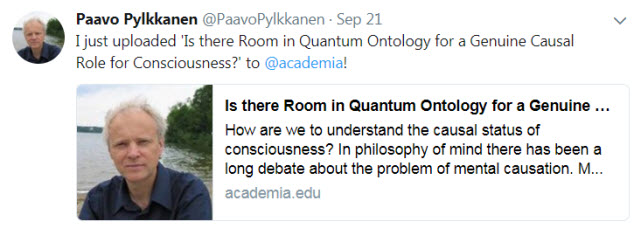Paavo Pylkkänen discusses David Bohm’s interpretation of quantum theory, including mind and matter, in this article — Is there Room in Quantum Ontology for a Genuine Causal Role for Consciousness?

Here are some quotes from the article (my emphasis in bold):
… active information is playing a key causal role in physical processes at the quantum level.
… organisms that are conscious of their own and others’ mental states have a better ability to interact, cooperate, and communicate.
… conscious experience … presents us with the options to choose from …
… certain conscious states … have an intrinsic motivating force … as an indivisible part of the experience itself.
… consciousness seems to be decisive for meaningful interactions with our environment.
… consciousness, flexible control, free will, and unified and integrated representations are all interconnected.
… information in conscious mental states is globally available to a number of different mental subsystems …
… information in conscious experience is typically very rich in its content — it is unified and integrated.
… consciousness both enables the sort of information that flexible control requires, and it also makes it possible for such information to reach the subsystems that are required in the execution of the control.
… matter at the quantum level is fundamentally different from the sort of mechanical matter of classical physics …
… then it is perhaps not so surprising that a very complex aggregate of such elements … has a body, accompanied by a mind that guides it.
Bohm proposed that we understand mental states as involving a hierarchy of levels of active information.
… Bohm saw nature as a dynamic process where information and meaning play a key dynamic role…
… the higher level of thought can organize the content in the lower level into a coherent whole.
Bohm went as far as to say that electrons have a “primitive mind-like quality,” but by “mind” he was here referring to the “activity of form,” …
… we could say that suitably integrated active information is conscious.
… in my view a major reason for its being ignored is that it goes so much against the prevalent mechanistic way of thinking …
Bohm’s suggestion was that a natural extension of his ontological interpretation of the quantum theory can include mental processes and even conscious experience …
More flexible control means … that the organism is able to choose from among different options the one that best fits the situation …
In Bohmian terms … consciousness enables the organism to suspend the activity of information.
… flexible control in the Bohmian view seems to involve higher-order, meta-level information that we are conscious of …
… there is … an interesting analogy between Bohm’s notion of common pools of information at the quantum level and the notion of collective intentionality in social ontology.
… Bohm emphasizes that information is typically active …
One possibility is that the presence of consciousness increases the level of activity of the information.
… quantum active information … is semantic and has both factual and instructional aspects …
… our ethical judgments (e.g., “the choice of the best”) can typically also affect the way information is activated, and consequently our behavior.
Our choices of “the best” are somehow related to value intelligence.
Related posts:
Book Review: Mind, Matter and the Implicate Order
The meaning of meaning
Meaning as being
Free flow of meaning
Leave a Reply
You must be logged in to post a comment.